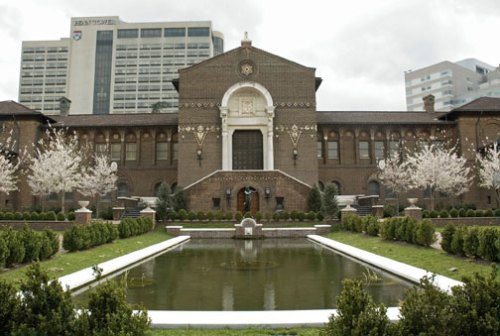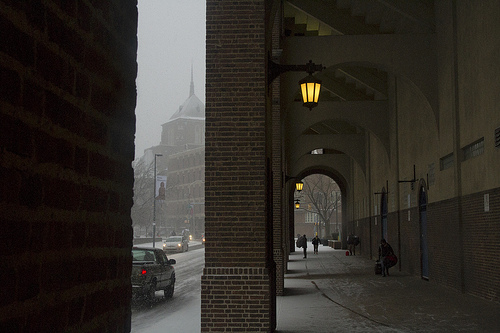Author: Molly Rand, GED’13
Sitting in class for 16 hours over the course of two days is not typically considered an ideal learning situation. The classes are long, the lectures are boring, and the group work is exhausting. Your attention span can only last for so long before you start counting down the hours on your hand – and the result of that calculation is always less than desirable. However, I know from experience that this doesn’t always have to be the case.
As a part time student in Penn’s Graduate School of Education, I enrolled in the Nonprofit Leadership Workshop series for the second consecutive spring semester to complete my elective requirements for the Higher Education Master’s program. The course, which is offered by the School of Social Policy and Practice, is compiled of 3 two-day workshops. If you do the math, the total comes out to about 38 hours in 6 days after subtracting a few hours for lunch and quick breaks. A student would actually spend close to 8 less hours in class during a full semester-long course. So why would this marathon of a course be something I choose to take not only once, but twice in the ten classes required to complete my Master’s program? There are so many reasons…
Senior Associate Director of the MS in Nonprofit Leadership Program, Eric Ashton outlines it clearly in the course syllabus. There are multiple areas within the nonprofit space that viable leaders may wish to have some level of exposure to over the course of their professional careers and career development. As the overall course instructor, Ashton speaks more on the fact that often in our busy lives we do not get educational opportunities on a range of current or innovative topics. This course was created and designed to allow students to select from a changing menu, subject matter that will be presented in small bite size opportunities to be exposed to current trends or topics important for strategic thinking in positions of leadership and decision making. Each topic is presented in a seminar style workshop led by an instructor who is an expert in that area.

The School of Social Policy & Practice is located in the Caster Building. The Caster Building is where all NPLD workshops take place this semester.
Interested in the socioeconomic development of urban areas? Let George Washington University’s Associate Professor of History Chris Klemek take you on a two-day field trip of our historical city in his workshop Philadelphia as Crucible: 400 years of crisis, leadership & change. I participated in the hands-on workshop during a weekend last April and can say that I now know the historical significance of that grid like courtyard on 2nd street between Walnut and Chestnut next to the Ritz movie theatre. It actually has a name too!

Philadelphia’s Welcome Park
Think it might be valuable to learn more about negotiation and strategic persuasion and ways to improve your own skills? Take a two-day workshop with consultants from the Center for Advanced Research (CFAR), a management consulting firm specializing in strategy and organizational development. www.cfar.com/. Some of the breakout exercises in this workshop resembled what might occur during an episode of Antique Road Show while others were more geared towards students honing in on their own business negotiating skills. During an in-class persuasion exercise, I was able to persuade my classmate that an incredibly valuable book my hypothetical great aunt once owned was an original, only copy left edition worth $7,500. The information sheet that I was given about the item, which my partner was unable to see, exposed the worth of the book to be at an absolute best $1,500. When we announced to the class how much we had “sold” the book to our partner, and mine had gone for the highest amount, I wasn’t quite sure what that meant. Either I am an incredibly convincing persuader or she was just a gullible classmate who didn’t really care about the value of some made up piece of literature. Either way, I learned a lot those two days.
My first of three workshops this semester just concluded this past weekend. The class was titled Social Entrepreneurship and was taught by Associate Director of Wharton Entrepreneurial Programs and Director of Wharton’s Societal Wealth Program, James Thompson. Professor Thompson’s Wharton-wit, intriguing South African accent, and Ed Harris-meets-Daniel Craig looks only add to the workshops interesting content and structure. http://www.whartoncapetown08.com/bio-thompson.html. I never thought that when I began my graduate program, I would be discussing how to create a successful consumption chain for raising and selling chickens as an entrepreneurial venture in Zambia. In the words of Professor Thompson, “think big, start small, and change fast.” This is a concept that will stay with me forever.

Some of my classmates during the Social Entrepreneurship Workshop last week
There is no question that this course is unique. One might argue that these workshops are not directly applicable to the work I currently do in Alumni Relations. I would disagree. The way these classes encourage and challenge my way of thinking is the most valuable component of this “leadership series.” I meet people from other schools and walks of life – undergraduates, MSW students, second-year MBAs, nonprofit professionals, and professors who are absolute experts in their fields. I walk away from these two-day “crash courses” and realize how fortunate I am to be exposed to such new and exciting disciplines. I am inspired to be innovative and learn more about my own personal skills. Most importantly, I’m not ready to stop learning and these workshops allow me to continue in an unconventional and engaging way.
Being submersed in these educational environments for six full days is a brain exercise unlike any other. For those few days, I am working to be an expert on urban development, or strategic negotiation, or the necessary way of thinking to differentiate myself from competition and succeed as a social entrepreneur. For six days during the semester, I am part of an exclusive group of individuals all working together to learn something new, challenging one another along the way. This is one of the many reasons I love being a graduate student and employee at Penn.



























